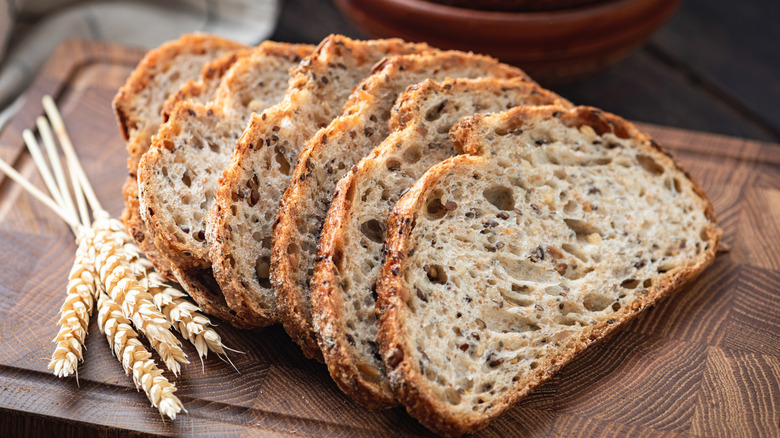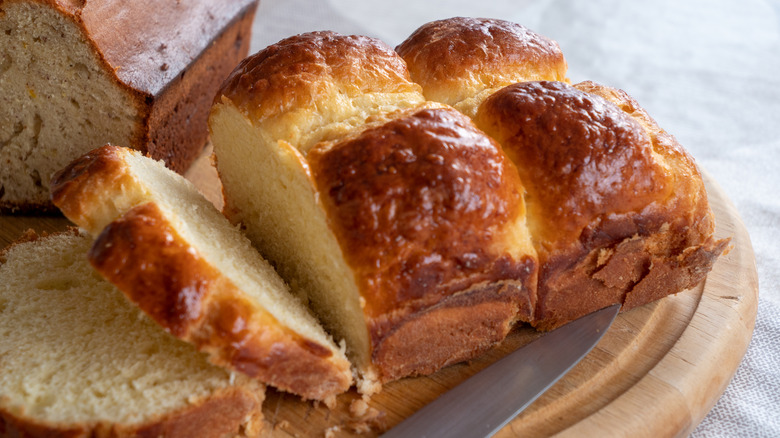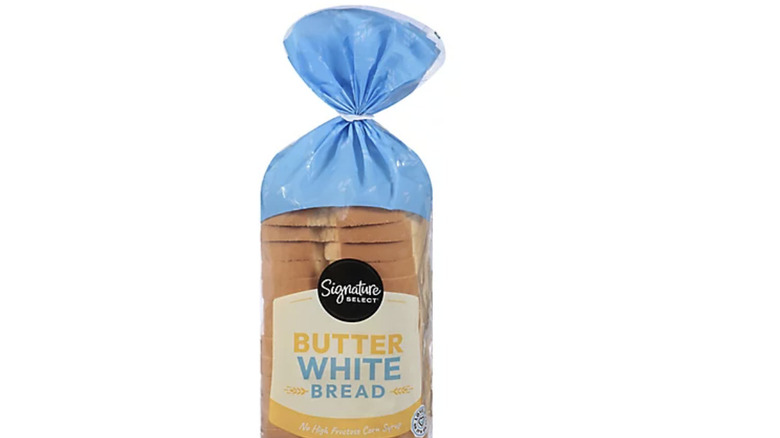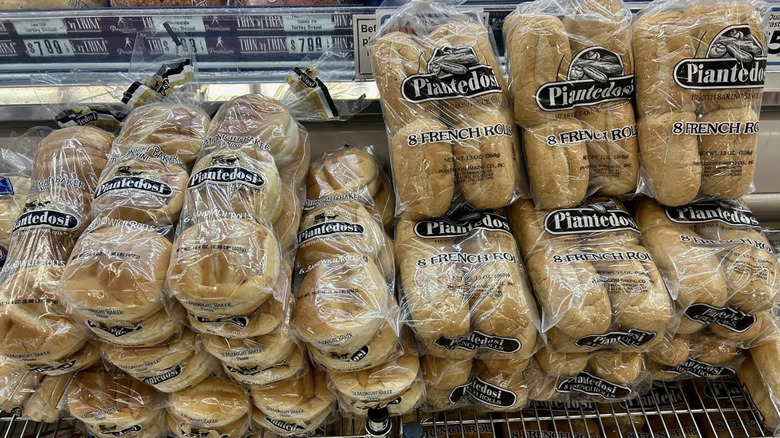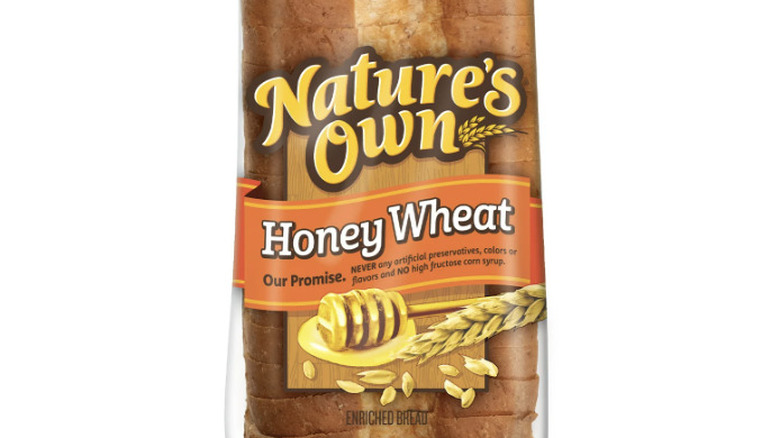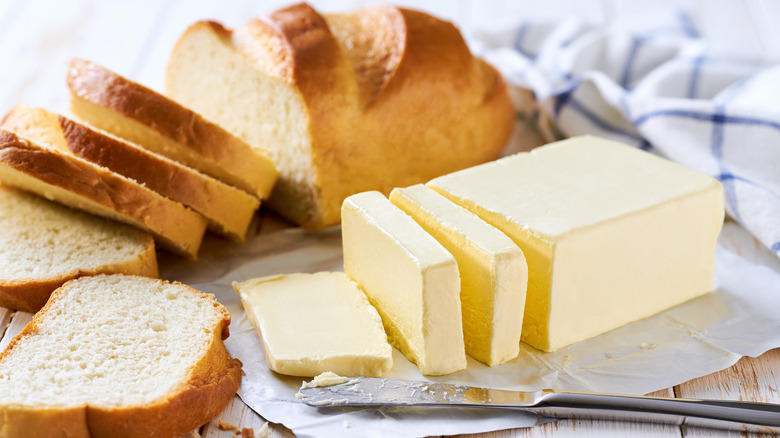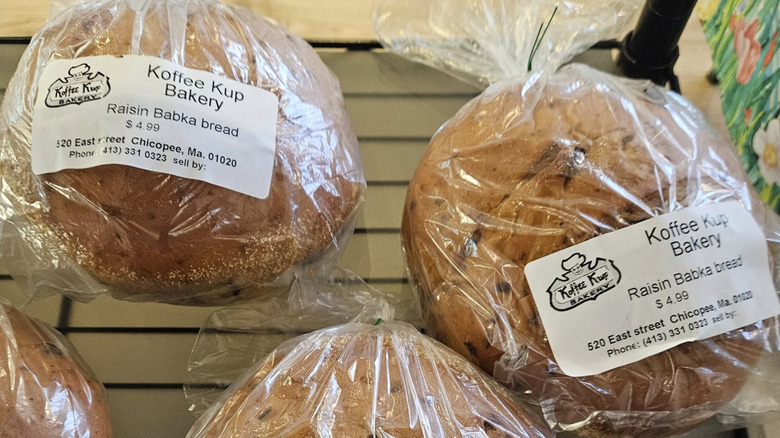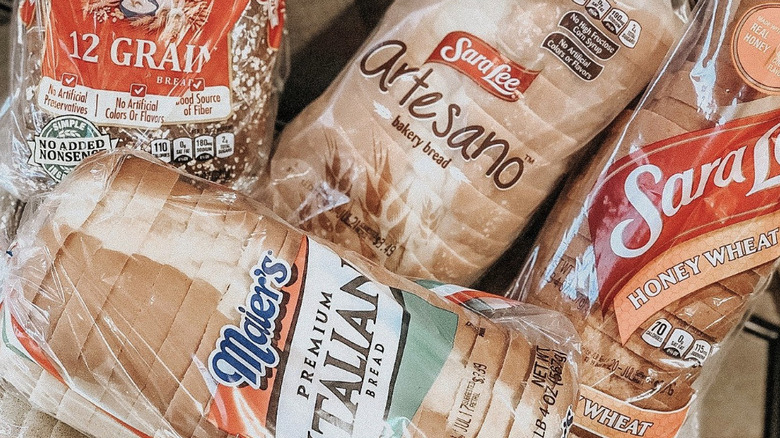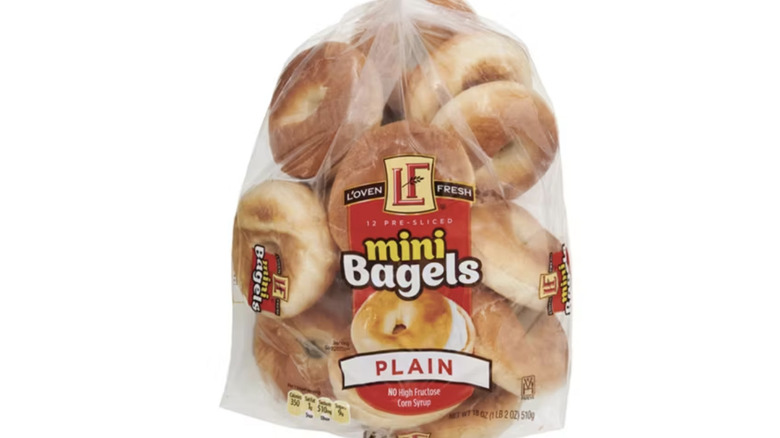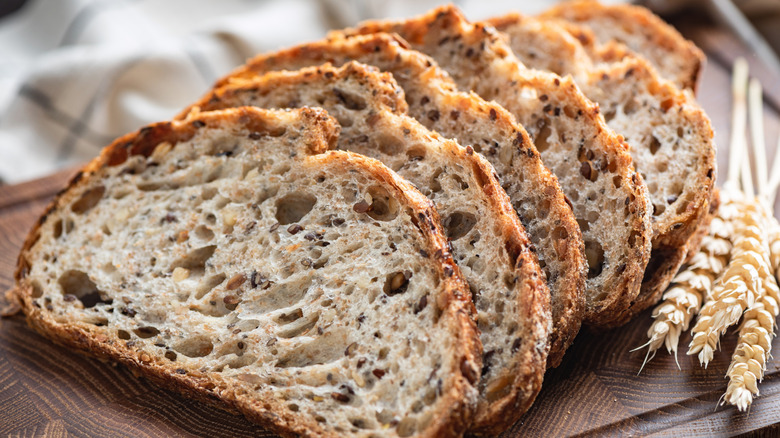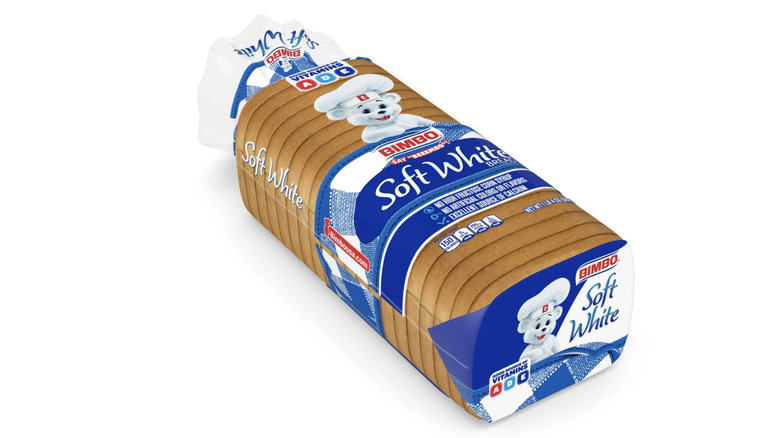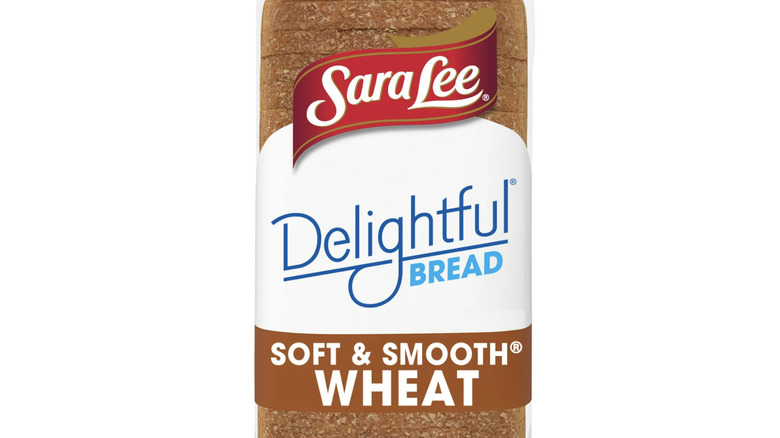Bread Recalls That Affected Millions
We may receive a commission on purchases made from links.
Bread has been a dietary staple for thousands of years. According to Innova Market Insights, 72% of Americans purchased bread products in 2024, with almost ⅓ of them enjoying baked goods more than four times a week. There are many explanations for our love affair with bread, from its delicious taste to its affordability and versatility. Whether it's a sourdough you made from scratch or a crusty French baguette picked up from the local bakery, bread pairs well with a huge range of ingredients from cheeses and spreads to cured meats.
On the commercial side of things, bread is relatively easy to produce, usually consisting of nothing more than flour, yeast, salt, and water. Nevertheless, things don't always go according to plan. Despite its simplicity, bread has been the subject of several major recalls over the years. From undeclared allergens to contamination with foreign objects or pathogens, recalls can shake consumer confidence but hopefully serve as a reminder to manufacturers that they must remain vigilant throughout the production process. Ready to find out more about some of the biggest bread recalls to hit the industry? We're here to bring you up to speed on the most significant baked good mishaps to hit headlines.
The Bakery Group recalled brioche loaves and buns over undeclared ingredients in 2025
Although the affected baked goods were only distributed in Texas, the recall announced by The Bakery Group in March 2025 could have had serious consequences. The main issue involved undeclared milk, soy, and Yellow 5. While milk and soy are known allergens, Yellow 5 has the potential to contain benzidine and 4-aminobiphenyl, both of which are known carcinogens. In fact, the food dye has been banned in countries such as Austria and Finland. None of the allergens were disclosed on the packaging — a serious omission that was identified during a routine inspection by the State of Texas Health and Human Services.
The recall involved 629 cases of brioche loaves and 104 cases of hamburger buns, amounting to over 9,000 individual bread products. The baked goods in question were Ben E. Keith Co. Dense Brioche Pullman Loaf, Ben E. Keith Co. 4.5" Brioche HB Buns, and Rodeo Goat Casa Linda Brioche Pullman Loaf. The Food and Drug Administration defined the recall as a Class II risk, where the "use of, or exposure to, a violative product may cause temporary or medically reversible adverse health consequences."
Albertsons Companies recalls multiple bread products in 2024 due to fears of contamination by foreign object
Back in 2024, countless home cooks were stopped in their tracks while preparing beloved staples like a super crispy grilled cheese sandwich, French toast, or bread pudding. The reason? An unexpected bread recall issued by Idaho-based Albertsons Companies, which no doubt forced many to rethink their meal plans and make do with alternative ingredients.
The market recall was prompted by the discovery of metal and plastic shavings embedded inside the baked goods. As a result, the affected products were swiftly removed from supermarket shelves in California and Nevada, where the bread was distributed. However, it was unclear how the contaminants ended up inside the loaves.
So, what products were actually pulled from the shelves? The Class II recall affected Signature Select Butter Top White Bread, Athens Select Butter Top White Bread, and CalPia 100% Whole Wheat Bread. In total, over 13,500 units of bread had to be yanked from the store shelves to protect consumers from potential injury.
Potential microbial contamination in 2022 sparked the recall of Piantedosi Baking Company rolls
In 2022, the Piantedosi Baking Company announced a recall of several of its baked goods as an extension of an earlier withdrawal of an unspecified raw material initiated by Lyons Magnus. The market withdrawal was announced over fears of potential microbial contamination, including Cronobacter sakazakii and Clostridium botulinum. Botulism is a life-threatening condition characterized by symptoms such as blurred vision, slurred speech, difficulty breathing, dry mouth, and muscle weakness. While rare in humans, Cronobacter infections can also be very serious and even fatal.
Piantedosi's recalled products included a variety of different rolls, including gourmet burger rolls, Hawaiian sandwich rolls, and brioche-style slider rolls. The products had been distributed in 15 states in the U.S. While no illnesses were linked to Piantedosi and no pathogens were found in the company's baked goods, the recall was issued as a precaution.
Flowers Foods recalled Nature's Own Honey Wheat Bread due to mislabeling in 2021
Nature's Own Honey Wheat Bread comes with the promise of no artificial preservatives, colors, or flavors. It also contains no high fructose corn syrup, which some consider worse than sugar. Unfortunately, in December 2021, the product was found to contain an unexpected ingredient — milk. The issue arose after loaves of Nature's Own Butterbread, which contain milk, somehow ended up in Nature's Own Honey Wheat Bread packaging. The product was distributed in the states of Arizona, Colorado, Wyoming, California, and Nevada. A wholesale distributor in California that distributed the product in Mexico was also affected.
While milk may seem like a wholesome addition to baked goods, the Food and Drug Administration has listed the dairy product as one of the nine major food allergens. For people with milk allergies, exposure to dairy can cause symptoms such as vomiting, diarrhea, and rash. Severe reactions can sometimes even lead to anaphylactic shock. Luckily, despite the labeling error, no adverse health issues were reported by consumers at the time of the incident.
Flowers Foods recalled bread products after potential salmonella contamination reported in 2018
Founded in 1919, Flowers Foods is one of America's biggest producers of packaged bakery products, including breads, buns, and snack cakes. A testament to its enduring success, the Georgia-based company currently operates more than 40 bakeries in 19 states. Nevertheless, even the biggest names get things wrong sometimes, as shown in 2018 when Flowers Foods recalled several of its baked goods due to suspected salmonella contamination. The offending pathogen was discovered in the whey powder used to make the products.
The affected baked goods included Captain John Derst's Old Fashioned Bread, as well as Swiss rolls offered under the labels Mrs. Freshley's, Food Lion, H-E-B, Baker's Treat, Market Square, and Great Value. Captain John Derst's Old Fashioned Bread was distributed across Alabama, Florida, Georgia, North Carolina, and South Carolina, while the Swiss rolls made their way to supermarket shelves across the U.S. At the time, the products had not been linked to any adverse health incidents.
Koffee Kup Bakery recalled bread products over fears of plastic contamination in 2016
Koffee Kup Bakery closed its doors in 2021 after 80 years in business due to economic difficulties. In a pretty predictable turn of events, the company's assets were acquired by one of the biggest players in the U.S. baking game, Flowers Foods. Before Koffee Kup Bakery ceased operations, it faced other challenges, including a recall of bread products tied to a potential contamination with plastic.
In 2016, Koffee Kup Bakery recalled close to 100,000 baked goods after routine testing revealed the presence of pieces of clear plastic in its bread and rolls. Upon closer inspection, the company discovered that a piece of plastic had contaminated the production line and broke into fragments during processing.
The recall affected around 35 different products, including hamburger buns, hoagie rolls, sub rolls, and hot dog rolls. Aside from Koffee Kup-branded baked goods, Big Y and Market Basket-branded products were also affected by the recall. The bakery items had been distributed in 11 states, including Rhode Island, Virginia, Massachusetts, New Hampshire, Connecticut, Vermont, Maine, New York, New Jersey, Pennsylvania, and Maryland.
In 2015, Bimbo Bakeries recalled bread after suspected contamination with glass fragments
Bimbo Bakeries is the biggest producer of commercial baked goods in the U.S., with 55 bakeries and more than 700 sales centers around the country. As a part of Grupo Bimbo, the company stands behind a wide range of popular brands that produce baked goods — some of which were affected when Bimbo issued a recall due to possible contamination with glass fragments.
In 2015, Bimbo Bakeries recalled numerous bread and bun products sold under the brand names Sara Lee, Kroger, Bimbo, Nature's Harvest, Great Value, and L'Oven Fresh. The reason? A shattered light bulb at one of its bakeries. We can only imagine the scramble that took place behind the scenes. The problem was brought to Bimbo's attention after three customers complained about finding small shards of glass on the surface of their bread. The recall affected nearly 50,000 packages of bread distributed in 11 states. Fortunately, nobody reported any injuries related to the products.
Bagels were recalled by National Choice Bakery in 2015 due to undeclared allergens
While National Choice Bakery was acquired by Bimbo Bakeries in 2023, the company had made headlines years earlier when it issued a product recall over allergen labeling issues. In 2015, National Choice Bakery announced that it was pulling various bagels sold under the labels Market Pantry, L'Oven Fresh, Village Hearth, Dan's Pantry, Lender's, and Kroger. It's unclear exactly how many individual products — which were distributed in Illinois, Indiana, Kentucky, Michigan, and Ohio — were affected.
The products were pulled from the shelves due to the presence of undeclared peanuts and tree nuts. The move was taken after peanuts and almonds were detected in a batch of gluten supplied to the company by a third party. While no adverse health issues were reported at the time, consuming even trace amounts of peanuts or tree nuts can have dire consequences for individuals with allergies. Some of the symptoms of an allergic reaction include stomach cramps, vomiting, hives, dizziness, and shortness of breath. In the most severe cases, exposure to peanuts can even lead to anaphylactic shock, which can be fatal.
Bimbo Bakeries recalled multiple bread brands in 2013 over potential wire contamination
Finding a piece of wire in your scrambled eggs on toast is probably not a surprise that many of us would choose for our morning meal. That may have been the reality for many had Bimbo Bakeries not recalled a range of its bread products in 2013. The safety alert was announced due to concerns that a piece of flexible wire had contaminated baked goods during production at a third-party flour mill, thanks to a faulty wire screen.
The recall affected a range of Bimbo Bakeries products, including Sara Lee 100% Multi-Grain Thin Style Buns, EarthGrains 100% Natural 12 Grain Bakery Bread, and Arnold Healthfull 45 Calories Per Slice Multigrain Bread. Other affected brands included Brownberry, Farm, Harmons, L'Oven Fresh, and Stroehmann. While Bimbo Bakeries didn't provide an exact number of recalled products, none of them were offered in stores at the time of the recall.
This wasn't the first time Bimbo Bakeries experienced an issue with a faulty wire screen. Just a month before Bimbo pulled its baked goods from the shelves, the company announced a recall of Sara Lee, Publix Premium, and Thomas bagels across Alabama, Florida, Los Angeles, Georgia, Mississippi, North and South Carolina, and Tennessee due to potential metal contamination caused by faulty machinery.
An undeclared dairy allergen forced a recall by Bimbo Bakeries in 2010
Undeclared allergens are one of the most common reasons for recalls. The problem usually happens when manufacturers mix up packaging or when there is accidental contamination during the production process. While unlabeled ingredients may appear trivial to some consumers, to others, they can mean the difference between life and death, as even trace amounts of a certain ingredient can lead to severe health consequences.
In 2010, Bimbo Bakeries found itself in hot water after distributing bread that contained milk, an ingredient that wasn't listed on the packaging. The item at the center of the recall was Bimbo Soft White Bread distributed in California, Idaho, Washington, and Oregon. While no adverse reactions to the bread were reported by customers at the time, consuming the bread could have posed a serious problem to individuals allergic to dairy. Milk allergies can trigger a range of unwelcome symptoms, including vomiting, wheezing, digestive issues, and hives, and, in severe cases, even prove deadly.
Sara Lee pulled bread due to possible contamination with metal pieces in 2007
Before Grupo Bimbo acquired Sara Lee in 2010 for a cool $959 million, the company ran more than 40 plants and boasted around 4,800 distribution routes. Since Sara Lee operated on such a large scale, its 2007 recall of bread products — triggered by potential contamination with metal fragments — was particularly alarming. The recall was issued after a routine inspection revealed a damaged whole-wheat flour sifter, raising concerns that metal may have contaminated the baked goods during the production process.
The potentially serious mishap led Sara Lee to recall a range of bread labels, including EarthGrains and Sara Lee Delightful Wheat. Just some of the affected products included Great Value Split Top Bread, EarthGrains 100% Natural Wheat Berry, and Sara Lee Hearty & Delicious 100% Whole Wheat. The baked goods had been distributed in several states, including Mississippi, Alabama, Arkansas, Missouri, Georgia, Tennessee, Louisiana, and Florida. The Meridia bakery in Mississippi, where the problem occurred, was able to continue production using pre-packaged flour, which didn't require sifting.
